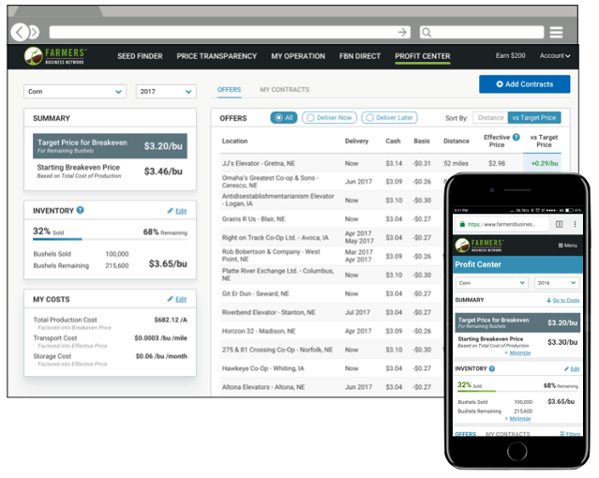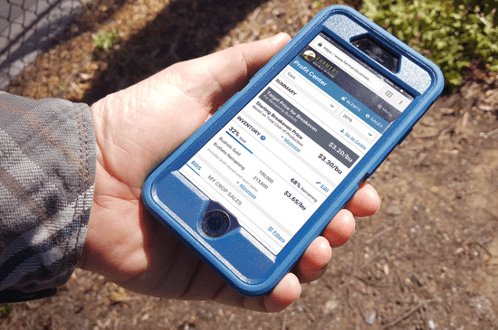Farmers Business Network (FBN) has added another service to its platform called FBN Crop Marketing, an online tool for farmers to market and sell their grain.
FBN says the tool offers a new future for crop marketing, using networks and data to increase profits and level out what it describes as an uneven playing field for farmers.
The platform is designed to replace what the company describes as an outdated and painful crop marketing practice where farmers confront persistent informational, financial, and market-access-related disadvantages.
Currently, many farmers are forced to resort to calling the local grain elevator or listening to the radio to get a sense of what price they could get for their crops. And, even if the farmer can identify a likely price, it’s often impossible to know whether it is the best price once you factor in shipping, storage, and other ancillary costs.
“If you only look at buyers within a five or 15-mile radius of the farm, you are going to leave a lot of money on the table because you could get a much higher price 45 miles away if you’re willing to drive an extra 20 miles,” says Chares Baron, cofounder of FBN. “That extra profit may be enough to justify hiring a driver to transport crops longer distances.”
FBN Crop Marketing has two main goals: to connect farmers with the best bids for their crops and to help specialty growers, which includes organic and non-GMO crops, connect with the purchasers who are looking for their specific plant varieties.
What is FBN Crop Marketing?

FBN Crop Marketing has two main components. First, FBN Profit Center provides farmers with a way to track and manage their crop marketing activities and to analyze the estimated profit they could realize from daily bids from over 4,000 interested buyers. It assesses each farmer’s individual costs including production, transportation, and storage to identify the bid that will bring home the most net profit. It also sends alerts to farmers’ phones for particularly lucrative bid opportunities.
“It’s the dashboard for your crop marketing. It taps into over 4,000 buyers who are all submitting daily bids, sometimes multiple times a day. It solves two basic problems, including price discovery and then knowing whether the offer is going to bring you the best profit,” explains Charles Baron, cofounder of FBN.
Second, FBN Select Markets is how the platform provides farmers with access to premium crop contracts and packages. As Baron puts it, this is where FBN goes out and finds buyers for farmers’ crops. It identifies exclusive opportunities where buyers are willing to pay premiums for specific crop attributes like quality, traceability, and seed variety instead of strictly quantity.
“Marketing is among the most complex thing that a farm has to do and it can be very frustrating and emotional for farmers,” says Baron. “Farmers rely on outside advisors or simply don’t feel like they are getting the best outcome from crop marketing. We are trying to help them simplify the complex skill of marketing and to make it easier for them to make more money.”
So far, the platform seems to be achieving FBN’s twin goals. In one example, the company reports that a South Dakota farmer using the service earned an extra $135 per acre for his non-GMO soybeans because he was able to connect with a buyer looking for his specific crop type.
Scaling potential
Within the first few days of launching, FBN saw hundreds of its members opt into Crop Markets, reports Baron. While the platform doesn’t presently collect any aggregated data on contract trends, average prices, or geographical variances, Baron has considered adding a benchmarking component down the road.
FBN also sees potential scaling and expansion opportunities through partnerships, including food companies, processors, distilleries, manufacturers, and other potential buyers, particularly when it comes to meeting the rising demand for unconventional food products.
“What’s happening in the food industry is what I like to call mass specialization. Things that were niche like organic and non-GMO are not niche anymore and reaching mass scale,” he says. “But the supply chain on the farm and grain side hasn’t caught up with where the consumer trends are growing. A lot of farmers don’t have access to markets where they could capture premiums by growing premium crops or crops with specific opportunities. Many farmers are interested in growing these new types of crops but they don’t have a clear market for them.”
Even for conventional or traditional commodity growers, having crop data plugged into the marketing platform can help link them with buyers looking for specific varietals or seed traits, even when it comes to ethanol facilities hunting for optimum corn varietals.
Farmers: bankers of the industry
While FBN Crop Marketing is obviously geared toward helping farmers be better marketers and sellers of their products, it’s underlying intention strikes at a more pervasive issue that Baron has seen in the agriculture industry.
“One of our farmers put it very succinctly. He told me that farmers are frustrated and tired of feeling like they are the banker of the industry. They pay early for inputs, don’t receive payment for a crop until well after harvest, and have to float all their operating costs on working capital throughout the year. This puts an enormous strain on farm finances.”
When combined with FBN Direct, the crop chemicals and input procurement and financing service, FBN Crop Marketing flips the script and takes the lion’s share of risk off the farmer’s shoulders.
“We are taking more risk with our farmers in an industry that has over decades built a system that shifts all the risk over to the farm,” adds Baron. “We are trying to give farmers a fundamentally different financial package where they have better working capital and higher profitability. If you asked a farmer how he or she would want to sell their crop, this is it.”
Competition?
Although there are existing channels for marketing crops, including brokers and advisors, Baron doesn’t view them as direct competitors. According to him, the new system is first-of-its-kind.
But there are other startups innovating in this space, including FarmLead, which helps growers, who typically sell to a handful of local buyers, to negotiate better prices for their grain by opening them up to a new set of potential buyers online. Monsanto Growth Ventures recently invested in FarmLead’s $6.5 million Series A. In the UK, Graindex is another example.
The rise of FBN
The launch of Crop Marketing marks another step in FBN’s rapid growth, which started as a farmer-to-farmer network and data analytics platform in 2014.
In February 2016, it debuted FBN Procurements, which helps farmers source ag chemicals and other inputs at the cheapest rates, as well as offering financing. Much like Crop Markets, Procurements is designed to take the guesswork out of purchasing essential inputs and to create a more transparent marketplace for farmers.
Later that year, it raised a $20 million venture round led by Campbell’s Soup’s new $125 million food and ag investment fund, Acre Venture Partners, serving as an extension of the company’s $15 million Series B led by Google Ventures.
Recently, the company indicated that it was conducting research regarding seed relabeling. According to FBN, companies relabel seed products and offer the same seed at varying prices. FBN has found examples where the cost difference in one state exceeded $60/bag, or $29/acre. After hearing many other like cases from farmers in their network, FBN put out a call for farmers to send in all their seed labels for examination.
Although the company seems to be expanding and diversifying at lightning speed, there’s a clear common denominator underlying each new endeavor. When asked whether he’d ever consider selling one of FBN’s platforms, he was quick to respond. “No, no. We are an independent system and we intend to stay that way. Creating independence and fairness for farmers is the motivation for a lot of what we do.”





